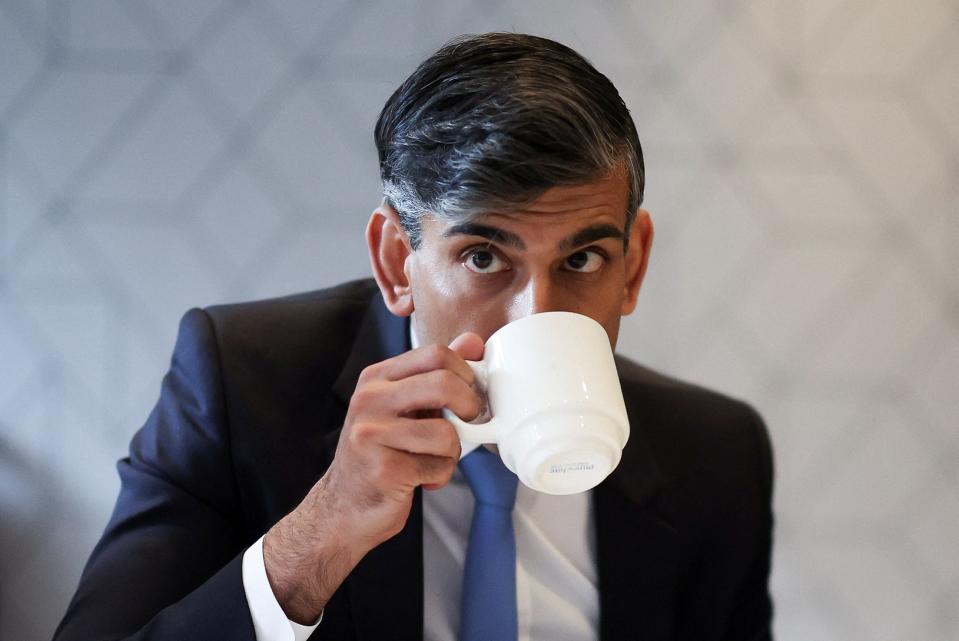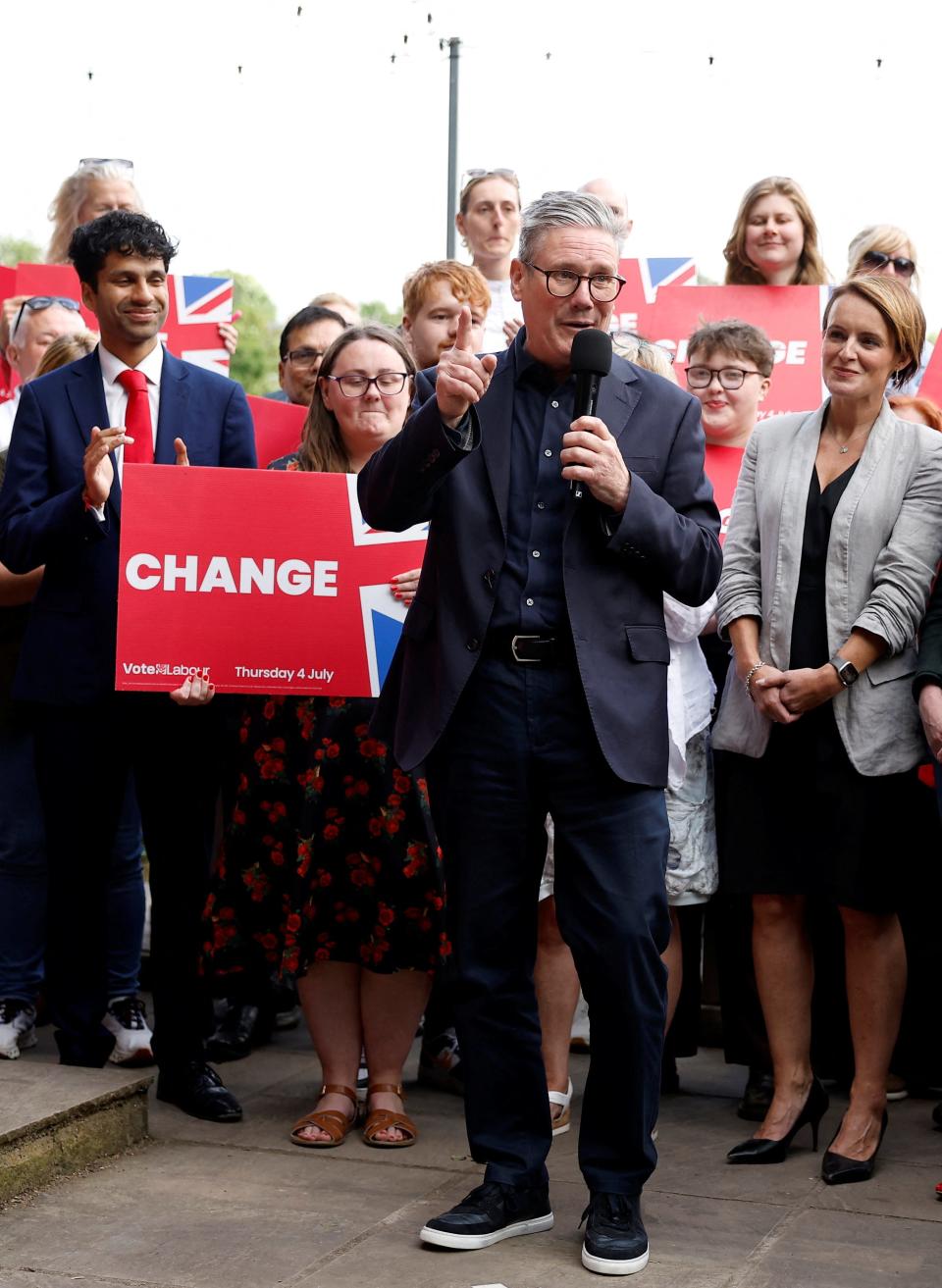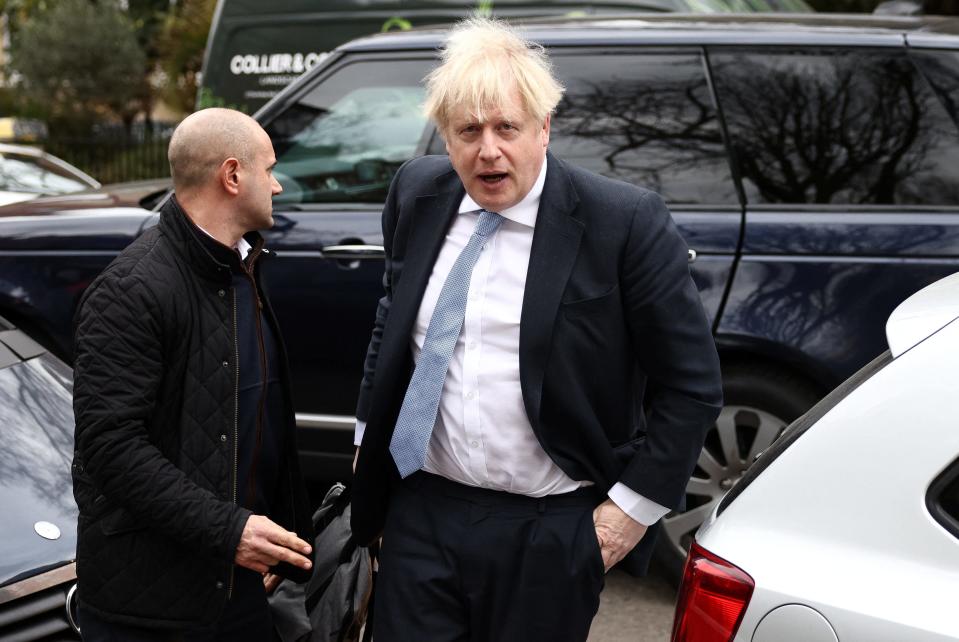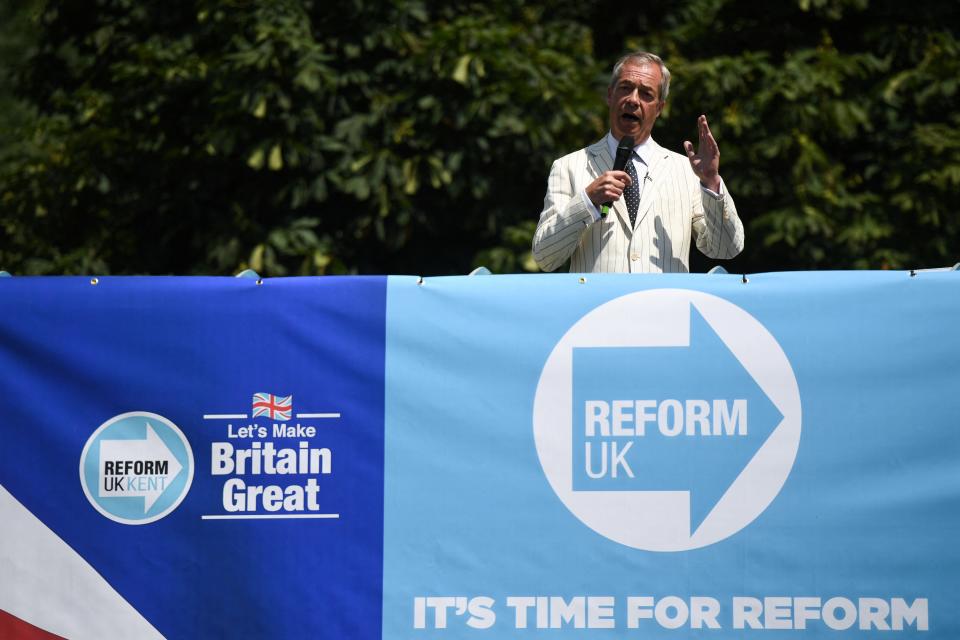Not even Samuel L. Jackson can save Britain's ruling Conservative party
LONDON − He tells his team setbacks are part of the journey. He extolls the importance of resilience. Champions, he says in a clipped English accent that denotes "posh gent," keep pushing forward.
But the headwinds are blustery and accelerating.
On July 4, America’s Independence Day, Britain is all but certain to vote out the ruling center-right Conservative Party after 14 tumultuous years. Conservative lawmakers like the steely Sir Iain Duncan Smith, are − for the first time in a long time − on the sharp end of an election.
Britain’s Tories, as the Conservatives are known, have dominated for decades, winning 8 of the last 11 votes. Those days may be over as voters flock to the opposition Labour Party and its methodical if slightly flavorless leader Keir Starmer.
'Sir' Keir Starmer: Meet UK's next likely prime minister
Amid moribund economic growth and decaying infrastructure, support for the Conservatives has hit record lows, with the party on track for its worst-ever election result. Prime Minister Rishi Sunak’s ratings are at an all-time low, while many are struggling with steep rises in the cost of living that have pushed Britain’s poverty rate to 18%.
Three years after Brexit − when Britain left the European Union − immigration, a key factor in that polarizing decision, has never been higher.
The Conservatives, one expert says, are headed for “extinction.”

Advice from Samuel L. Jackson
Still, as the going gets tough, Smith who attended Britain's revered Royal Military Academy Sandhurst, made a surprising choice to rally a platoon of campaign volunteers on a recent day.
Surveying his troops, the 70-year-old turned not to party mainstays Winston Churchill or Margaret Thatcher for inspiration. Instead, this lawmaker of three decades reached across the pond to U.S. popular culture – and the gritty 2005 Samuel L. Jackson basketball drama “Coach Carter.”
"In the middle of the game, when they're really going to pieces, and they're really just not playing properly, Coach Carter calls a time out, brings his team in, and he says something very simple to them. He says: 'We play our game. We don't play their game.'”

Smith spoke outside the main train station in Chingford and Woodford Green, a mixed-income district 12 miles from central London.
He handed out fliers to the volunteers encapsulating what he said was his game: getting a local hospital rebuilt; raising funds to fix a bridge; increased police patrols; and supporting a library he claimed the area's Labour-run local government was trying to close. (The local council blamed the library's dire straits on years of Conservative cuts.)
"I'm focusing on one thing only, and that's this constituency and who can do the best for it," Smith said, marching off to persuade residents. He wore a pair of Nike sneakers, and the collar of his polo shirt was firmly turned up in a manner associated the British upper classes, expensive private schools and rugby players.
Coach Carter's rousing words rang in his ears.
Boris Johnson's COVID parties and a financial meltdown
The problem for Smith and other Conservatives is that, for many in Britain, the political mood music of the last 14 years has been far from stirring.
It's a period that encompasses a messy, divisive Brexit vote most Britons now view as a mistake. The COVID-19 pandemic saw the U.K. experience higher rates of infection, hospitalization and death than other advanced economies − despite spending longer in strict lockdowns.
Tousle-haired and gaffe-prone Boris Johnson was prime minister for just three years. But each one was stormy.
Johnson faced waves of resignations from his cabinet. He was investigated by police for the so-called Partygate scandal, when Johnson ignored his own lockdown to tipple with staff and friends. He devised, and Sunak implemented, what experts say was a madcap and ineffective plan to send asylum seekers to Rwanda.
'Stop the boats': Britain wants to send asylum seekers 4,000 miles away to Rwanda
Liz Truss, Johnson's successor, resigned just 44 days after unveiling an economic plan that spooked financial markets, spiked mortgage payments and tanked the British pound.
Truss's precarious position sparked an avalanche of memes asking if her government could outlast a head of iceberg lettuce. Chaos gripped the nation. A wilting vegetable won. Truss’s tenure was the shortest in British history.
'People feel that nothing works'
For much of the past decade, Britain has, meanwhile, been beset by perpetual labor strikes, from train drivers, doctors, teachers and just about any other profession with direct or indirect connections to the underfunded and overburdened welfare state.
Even Queen Elizabeth II, to use a British phrase, decided to "pop her clogs" under a Conservative government. Britain's beloved monarch, who reigned for 70 years and 214 days and met 13 out of the last 14 U.S. presidents, died at 96 just two days after swearing in Truss.
Tim Bale, a professor of politics at Queen Mary University of London, said part of the problem for the Conservatives is they've been in power "too long for people to forgive" the lack of improvements to their lives. After so long, "it's difficult to accept excuses," he said.
For real: An AI candidate is on the ballot for U.K. election
"People feel that nothing works. Everything from potholes in the streets to getting a doctor's appointment. It just seems to be really, really difficult these days," said Bale. "I think that's due to the chickens of austerity coming home to roost."
"If you prioritize, as the Conservatives did before COVID, low spending and low taxation, it's going to impact basic services like health and education and bring local councils to the brink of collapse."
Read his lips: No new taxes
Yet it's not clear Labour has the answers.
Starmer, 61, a former prosecutor and human rights lawyer known for his thoughtful manner and grasp of policy detail, has pledged to kickstart growth by reforming the economy and focusing on five “national missions" that will, he says, "end the chaos."
This involves, Starmer says, abiding by tough spending rules. It also means nationalizing train lines and at least one energy firm, cracking down on wealthy tax evaders, hiring more teachers and police officers, and reforming the country’s border security.
Starmer has vowed to cut waiting lists at public hospitals, boost subsidies for daycare and help Britain's relatively unproductive workforce re-skill for emerging industries. (Labour also pledged to fix a million potholes a year.)

But there's a catch: Starmer says he'll do it without raising taxes. At least not right away.
"Labour is offering the country a very simple message: It's the change party," said Matt Beech, who directs the Center for British Politics at the University of Hull. "In reality, I'm not sure how much fiscal room there's going to be.”
"If and when Labour becomes government it's going to need to find some cash from somewhere pretty quickly," said Bale. "The problem is, it's ruled out a lot of obvious sources of that cash,” including tax hikes.
Oliver Duff, editor of the “i” newspaper, wrote recently that "both parties have colluded” in what watchdogs call a "conspiracy of silence," refusing to face “tough tax and spending choices.”
Gaza war haunts the UK election
Starmer has tried to remodel Labour after a crushing election defeat in 2019 under Jeremy Corbyn, whose left-wing policies on everything from nuclear weapons to the royal family alienated many voters.
Corbyn, who often attends pro-Palestinian rallies, was suspended from the party over allegations connected to anti-semitism.
Still, Labour’s campaign has not been entirely smooth sailing.
One distraction grabbed headlines in Smith's constituency, after Starmer dropped the Labour candidacy of economist Faiza Shaheen after she "liked" social media posts that allegedly downplayed anti-semitism allegations linked to Israel’s war in Gaza.

Some Labour voters more broadly have been upset over what they see as Starmer's implicit support for Israel and his failure to quickly call for a ceasefire. (He did eventually.) The party has seen rebellions and resignations over the war.
For Conservatives, the issue is even more toxic in a country where, as that war has dragged on, surveys show Britons are far more likely to sympathize with Palestinians than Israelis.
Starmer is 'beyond landslide territory'
The outcome of Britain’s vote is not expected to substantially change its close relationship with the U.S., though Labour would be more comfortable with President Joe Biden than the unpredictable Donald Trump.
Labour chose not to make someone available to speak with USA TODAY at its local offices in Chingford and Woodford Green. Shaheen, dropped by Labour, is now running as an independent. Smith won the district in 2019 by fewer than 1,300 votes. Polls show he has his work cut out for him.
At least he stands a chance.
YouGov, an online survey firm, forecasts Labour may win 425 out 650 seats in Parliament, a result it described as "beyond landslide territory" and that Matt Goodwin, a professor of politics at the University of Kent, called an "extinction level event" for the Conservatives.
If the polls are accurate, Labour could win Britain’s biggest majority since 1924. The Conservatives could be reduced to just 108 seats, their worst performance since 1906.
Immigration: Robbing Peter to pay Paul
While out knocking on doors in Chingford and Woodford Green, Smith conceded the public was dissatisfied.
But he ascribed much of the nation's predicament to external factors like the COVID-19 pandemic and Russia's war in Ukraine. Both, he said, fueled a sharp rise in food, energy and transportation costs.
"No government since World War Two faced what we faced," Smith said.
In a recent briefing with reporters, Foreign Secretary David Cameron said something similar. "COVID hit the economy like an iceberg hitting a ship," said Cameron, a former Conservative prime minister.
Few economists would dispute this.

Britain was particularly susceptible to energy price shocks caused by fluctuating gas supplies from Ukraine after Russia's 2022 invasion. The pandemic and the Ukraine war disrupted trade and aggravated inflation.
Still, Beech, of the University of Hull, said those factors are only part of a "necessary but not sufficient" explanation for the Tory decline.
"To be a sufficient analysis you also have to look at several big policy failures that have underlined the fact that the Conservatives lost their reputation for governing competence," he said. "The first one, perhaps the most important one, is that Boris Johnson took Britain out of the EU on a pledge to reduce low-skill and no-skill immigration from the EU.
"He did that. Then non-EU immigration skyrocketed. He robbed Peter to pay Paul."
'The Conservative brand is broken'
An analysis by the independent National Centre for Social Research, found that trust in the country's politicians has rarely been lower.
Almost six in ten said they would "almost never" trust a politician to tell the truth in what the survey characterized as a "tight corner' – when facing some kind of pressure.
The last time trust was so low in Britain was in the wake of a 2009 Parliamentary expenses scandal. One lawmaker was found to have spent almost $40,000 in public money on renovations to his backyard, including $2,000 on an “ornamental duck island.”
This may partly explain the appeal of Brexit provocateur Nigel Farage, perhaps the most famous politician in Britain who has never been elected to the House of Commons (though he did serve in the EU’s Parliament).

After several years in the political wilderness when he pursued a TV career on a FOX News-like channel and spent time in the U.S. campaigning for his friend Donald Trump, Farage announced in early June he was re-taking the reins of the right-wing Reform UK party.
Polls show Reform UK snapping at the heels of the Conservatives. YouGov’s latest polling, from June, put support for Conservatives at a galling 18% while Farage’s Reform garnered 17%. Support for Reform has stayed strong despite claims of racism and poor personal conduct among some party activists and candidates.
In an interview with USA TODAY, Farage said he was joining the race "to, well, to use a D-Day analogy, establish a beachhead and build for 2029," when the next general election takes place.
"The Conservative brand is broken. It might have been around for 200 years but I think it's done," said Farage.
On the doorstep in Chingford and Woodford Green, a hospital worker told Smith he was grateful to him for getting a tree removed that was blocking his driveway.
Another said he'd always voted Conservative and probably always would. "Isn't that a good enough reason?"
A third, a teacher and probable Labour voter, said, "I don't want that guy to win," motioning toward Smith, who was around the corner, out of view.
This article originally appeared on USA TODAY: UK Conservative Party faces potential wipeout


